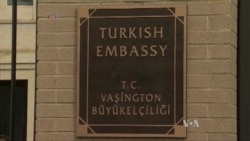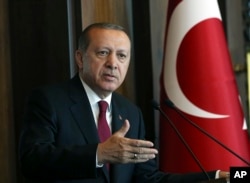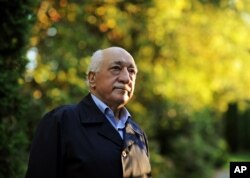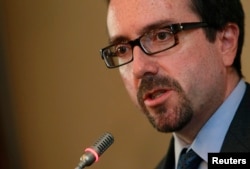The United States says it is "very disappointed" by the Turkish government's arrest of two local staffers of the American Consulate, as diplomatic tensions between the two countries ramp up following the bilateral suspension of all nonimmigrant visa services.
Last week, for the second time this year, Turkish authorities arrested a local staff member of the U.S. diplomatic mission. U.S. Ambassador John Bass later announced a temporary halt to all nonimmigrant visa applications. Turkey retaliated by announcing its own suspension of visa services in the United States.
On Tuesday, the State Department confirmed that Turkish authorities had summoned a third U.S. Embassy staff member over the weekend. That staff member has not been formally arrested.
"These actions are deeply disturbing to us," State Department spokeswoman Heather Nauert said during Tuesday's briefing.
Nauert also rejected suggestions that Bass had acted unilaterally in suspending visa services in the U.S. Embassy and consulates throughout Turkey.
"Our ambassadors tend to not do things unilaterally," said Nauert. "This was coordinated with the State Department. It was coordinated with the White House and coordinated with the embassy."
Officials say U.S. Secretary of State Rex Tillerson called Turkish Foreign Minister Mevlut Cavusoglu on Saturday. Undersecretary of State Tom Shannon also spoke to his Turkish counterpart prior to the announcement that the U.S. government would suspend nonimmigrant visa services at the U.S. Embassy and consulates in Turkey.
Bass said the suspension of nonimmigration visa service would minimize the number of visitors to U.S. Embassy and consulates in Turkey, while Washington assesses Ankara's commitment to the security of American diplomatic facilities and personnel.
Erdogan blames U.S. envoy
Turkish President Recep Tayyip Erdogan on Tuesday blamed Bass for the diplomatic crisis, saying Turkish officials would boycott farewell meetings with Bass, who is due to leave Ankara soon to take up a position in Kabul as U.S. envoy to Afghanistan.
"An ambassador in Ankara taking decisions and saying he is doing so in the name of his government is strange," said Erdogan.
Erdogan also accused "agents" of infiltrating U.S. missions.
"No state would allow such spies that pose an internal threat," Erdogan said Tuesday alongside Serbia's president in Belgrade.
The dispute has plunged already fragile relations between the two NATO allies to a new low after months of tension linked to the conflict in Syria, last year's failed military coup in Turkey, and U.S. court cases against Turkish officials.
"I think right now the domestic situation is very prone to anti-Americanism, and he [Erdogan] is playing on that," Gonul Tol, director of the Middle East Institute for Turkish studies, told VOA on Tuesday.
Extradition effort
Relations between Washington and Ankara have been troubled by disputes over U.S. support for Kurdish fighters in Syria and Turkey's unsuccessful request for the extradition of U.S.-based Turkish cleric Fethullah Gulen, whose followers were blamed by the Turkish government for last year's coup attempt.
The Turkish government has rounded up about 200,000 people, accusing them of not only stirring up the coup effort but also supporting the Gulen movement.
U.S. courts have also indicted a Turkish banker and a former minister for conspiring to violate U.S. sanctions on Iran, as well as 15 of Erdogan's security guards for attacking peaceful protesters during his visit to Washington in May.
It is "definitely a sign of deteriorating relations," Daniel Serwer of the Johns Hopkins School of Advanced International Studies told VOA. "Both sides need to stop escalating and start talking."
Arrest of consulate employee
Last week, Turkey arrested Metin Topuz, a U.S. consulate employee and a Turkish national, accusing him of having regular communication with alleged leading members of what Turkey has deemed a terrorist network blamed for the failed coup against Erdogan last year.
Washington dismissed the allegations, saying it has been unable to determine why the arrest occurred or what evidence exists against the employee.
"The employee works in an office devoted to strengthening law enforcement cooperation with Turkish authorities and ensuring the security of Americans and Turkish citizens," said Nauert, questioning Ankara's motivation for the arrest.
"What's going on here? What are they trying to accomplish by this behavior toward our locally employed staff?" the State Department spokeswoman asked.
Bass, the U.S. ambassador, said in a video statement on October 9 that the suspension of visa services was not a "visa ban" on Turkish citizens, but a suspension of the consideration of new visa applications.
Turkish applicants told VOA's Turkish service that upon going to the U.S. Embassy and consulates for their appointments, they were simply given a piece of paper instructing them to call a phone number for more information.
Omer Yavuz came from Bursa to the U.S. Consulate in Istanbul for a visa appointment that was postponed to this week. Instead of having an interview, he was given a piece of paper with a phone number on it.
"I've been calling the number several times since this morning but couldn't reach anyone. No one is giving any complete information. I came here today because I've read procedures would continue for approved visa applications. But I don't know what would happen," Yavuz said.
He said he probably needed to cancel plans to visit his cousin in Houston.
VOA's Turkish service and Esha Sarai contributed to this report.








